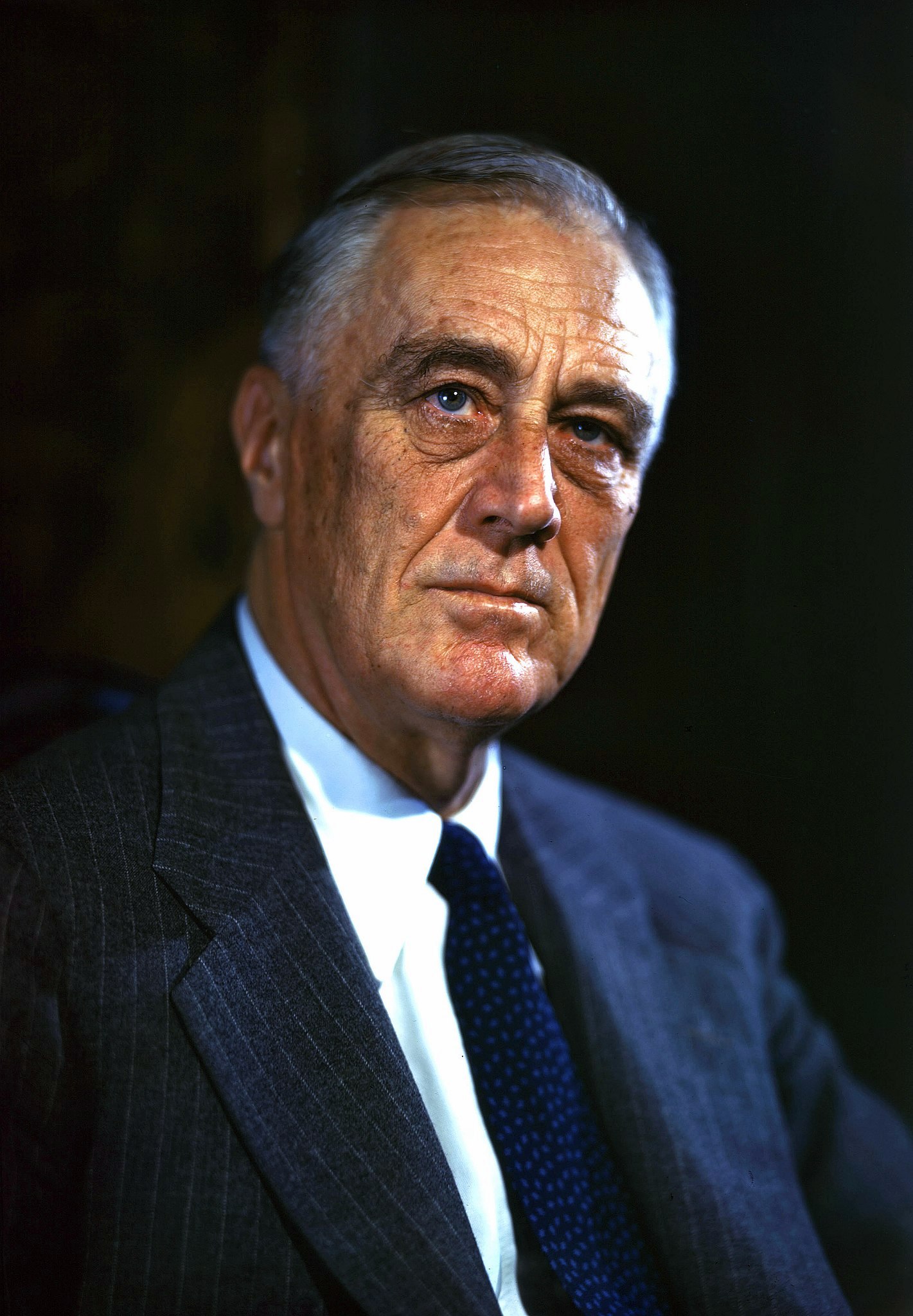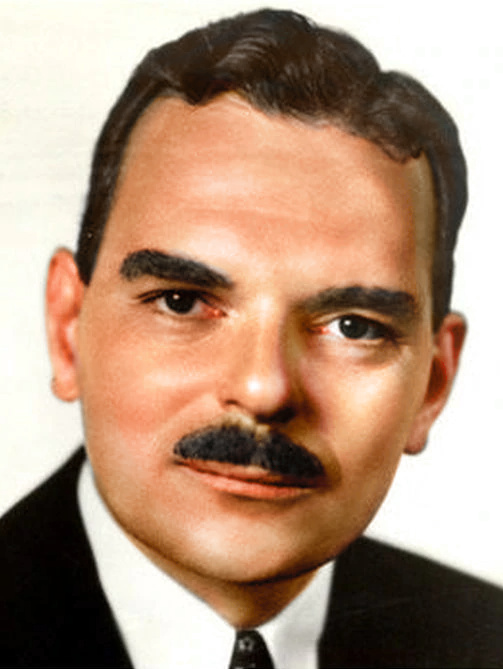The Pittsburgh Press (November 8, 1944)

ROOSEVELT IS REELECTED
Democrats gain in House
Dewey leads 14 states; total vote may reach record of 51 million
By Lyle C. Wilson, United Press staff writer
New York –
President Roosevelt’s fourth-term election was conceded today by Governor Dewey and with it came Congressional gains bolstering the Democrats in the Senate and guaranteeing their numerical control of the House with a clear-cut majority of the 435 members.
Democratic numerical superiority in the Senate was not in jeopardy in yesterday’s election.
As the count of ballots continued, incomplete returns tabulated by the United Press showed Roosevelt had won or was leading in 34 states with 407 electoral votes and Dewey had won or was leading in 14 states with 124 electoral votes.
The popular vote standing was:
|
|
| Roosevelt |
20,864,847 |
| Dewey |
18,234,463 |
The United Press tabulation indicated that a new voting record might be set in this election. The returns showed that if the average continues the total vote will be 51 million, exclusive of some service men and women ballots to be counted later. The total vote in 1940 was 49,548,221.
Mr. Roosevelt had won or was ahead in: Alabama, Arizona, Arkansas, California, Connecticut, Delaware, Florida, Georgia, Idaho, Illinois, Kentucky, Louisiana, Maryland, Massachusetts, Minnesota, Mississippi, Missouri, Montana, Nevada, New Hampshire, New Jersey, New Mexico, New York, North Carolina, Oklahoma, Pennsylvania, Rhode Island, South Carolina, Tennessee, Texas, Utah, Virginia, Washington and West Virginia.
Dewey had won or was ahead in: Colorado, Indiana, Towa, Kansas, Maine, Michigan, Nebraska, North Dakota, Ohio, Oregon, South Dakota, Vermont, Wisconsin and Wyoming.
Dewey failed to break through Roosevelt defenses in the East, and that is where he lost this election. The big cities and most of the big states went for a fourth term. Big New York State put its 47 electoral votes solidly behind the President.
But Roosevelt would have lost the state except for the aid of the American Labor Party, which is allegedly controlled or influenced by the Communists, and the new Liberal Party, an anti-Communist labor organization which made its political debut yesterday.
The Democratic Party polled only 2,500,000 votes while the Republicans were piling up 2,906,000 in New York State on the basis of nearly complete returns. But the ALP rolled up 452,000 for Roosevelt, and the Liberals contributed 345,000 more. That leaves the two minor parties in a significant balance of power position in the richest, most populous and politically most powerful state in the union.
Trend in service vote
New York City’s five counties – or boroughs – illuminated some of the mysteries of the absentee armed service vote.
Of the 242,082 armed service ballots counted in New York City, Roosevelt got 73 percent and Dewey 27 percent. Significantly, the armed service ballots showed a majority for Roosevelt even in the two New York boroughs which are normally Republican – Queens and Richmond, although the margins were not great in either.
Changes in House
The returns by midafternoon showed that 383 House members had been elected. The breakdown was:
|
|
| Democrats |
214 |
| Republicans |
167 |
| American Labor |
1 |
| Progressive |
1 |
| Contests undecided |
52 |
At the same time, 28 candidates had been elected to the Senate. The breakdown was:
|
|
| Democrats |
l8 |
| Republicans |
10 |
Undecided contests 7. Democrats led in 3 and Republicans in 4.
Senate holdovers who did not face polls this election: Democrats 36; Republicans 24; Progressive 1.
At 11:30 a.m., 13 governors had been elected, The breakdown:
|
|
| Democrats |
9 |
| Republicans |
6 |
Undecided contests 16. Democrats leading in 5 and Republicans in 11.
The big city machines poured in the presidential ballots for Roosevelt – New York, Jersey City, Chicago, Philadelphia and Pittsburgh remained loyal to the President, but Dewey was running a close Pennsylvania race. In New York City, Roosevelt had a greater vote and a greater plurality than in 1930, complete returns from the city’s five boroughs showed.
Dewey exceeds Willkie vote
He received 2,039,932 votes to 1,270,083 for Dewey in the city’s 3,700 election districts. This gave the President a plurality of 769,849 votes as compared with his 718,459 plurality over Wendell Willkie four years ago. His vote in 1940 was 1,966,083. Dewey, however, polled a heavier vote than Willkie, who got 1,247,624 in 1940.
Roosevelt was credited with 1,347,466 regular Democratic Party votes 388,608 American Labor and 303,858 Liberal Party votes. Even without the ALP and Liberal vote, Roosevelt had more than enough to beat Dewey in New York City.
Dewey conceded Roosevelt’s victory at 3:15 a.m. today in a statement which he read over the radio. The President heard it at Hyde Park and sent Dewey a “thank you” telegram.
‘No illusions for 1948’
As Dewes was leaving Republican headquarters somebody asked him about his plans for the future. He replied: “I have no illusions for 1948.”
Mayor Hague of Jersey City, New Jersey, the Democratic boss of the state, can congratulate himself on two counts.
His Hudson County machine apparently had turned up the votes to overcome Dewey’s lead accumulated elsewhere in the slate. And perhaps more important to Hague, it appeared that the proposal for scrapping New Jersey’s Constitution for a new streamline model had been licked.
Among advantages claimed for the proposed new Constitution was a set of provisions calculated to break Hague’s organization wide open and end his manipulation of one of the slickest political machines currently in operation in this country.
Governor Edge, a Republican advocate of the new Constitution, complained yesterday that Catholic priest had recommended in their churches Sunday that their communicants oppose the new Constitution. Edge charged that Hague had misled the clergy.
Other races recalled
The New Deal-Democratic machine, aided this time by a smooth organization of left-wing labor, was purring like a post-war motorcar. The popular vote was comparatively close and Mr. Roosevelt knew he had been in a contest. Dewey’s chief consolation, assuming there is no change in the trend, may be that he came closer than Herbert Hoover, Alf Landon or the late Wendell Willkie did to licking the champ.
The electoral vote score in those contests was respectively 472–56, 523–8, and 449–82.
The President stayed up until shortly after 3:30 a.m. EWT listening to the news, working pencils down to nubs on his own calculations and conferring by telephone with his scattered lieutenants. Between times he joshed with his White House aides gathered with him at Hyde Park and talked to the neighbors who assembled a couple of thousand strong in the grounds of the “big house” around midnight.
Thanks Dewey
Dewey sent no telegram of congratulations, a fact which Presidential Secretary Early remarked to newsmen at Hyde Park. But the President heard the broadcast report of Dewey’s concession and sent this telegram at once:
His Excellency Thomas E. Dewey,
Governor of New York,
Roosevelt Hotel, NY
I thank you for your statement which I have heard over the air a few minutes ago.
FRANKLIN D. ROOSEVELT
Dewey had said to reporters assembled at GOP headquarters:
It is clear that Mr. Roosevelt has been re-elected for a fourth term and every good American will wholeheartedly accept the will of the people. I extend to Mr. Roosevelt my hearty congratulations and my earnest hope for a speedy and lasting peace and the restoration of tranquility among our people.
Deweys leave smiling
There was a little more thanking his supporters and expressing confidence that “all Americans will join me in the devout hope that in the difficult years ahead Divine Providence will guide and protect the President of the United States.”
And then the Deweys went smiling on their way.
Some 120 reporters heard Dewey say he was licked. There had never been much enthusiasm around Republican headquarters on Election Day, although 2,000 or so party and headquarters workers gathered in the big Henrik Hudson room of the Roosevelt Hotel to whoop it up as the returns came in. What they hoped was that Dewey would make a victory appearance and give them a chance to raise the rood. The Governor did not show.
He was tempted to surrender at midnight, but decided to permit Republican Chairman Brownell to make a noncommittal statement instead.
Joy in Roosevelt camp
There was no foreboding up river where Mr. Roosevelt was the host and central figure. Just before midnight, his neighbors invaded the estate grounds and he told them that things were going fine.
“It looks like I’ll have to come back here on a train from Washington for the next four years,” he said and the crowd yelled its appreciation of Mr. Roosevelt’s appreciation of the community. It was worth the train trip just to get there for weekends, he told them.
“I’m glad to see you on this Election Day again – and I might say again, and again, and again,” he quipped.
The band of near-by Vassar College oompahed a tune and the rear porch affair was over. Less than four hours later, Mr. Roosevelt went to bed, confident that he had another four-year lease on the house at 1600 Pennsylvania Avenue, NW Washington, DC. He was in gay spirits and almost as pleased that Rep. Ham Fish was licked as that Dewey had conceded him a fourth-term triumph.
Betting odds recalled
Election returns followed the betting odds which had made Mr. Roosevelt a favorite.
This has been a bitter campaign and the feeling will carry over into the next Congress in spite of best intentions all around. There is resentment against the fourth term. The anti-New Deal coalition of Republicans and conservative Democrats probably will continue to function.
Dewey pronounced the Republican Party “revitalized” by this campaign for the good of the country and for “the preservation of free government in America.”
And he feels that he contributed greatly to national unity on the issue of the method and extent of our post-war collaboration in the world peace organization.
But it remains to be seen how far the so-called “isolationist” Republican legislators will follow his lead – now that he has conceded that he will be in Albany when the debate begins in Washington.



